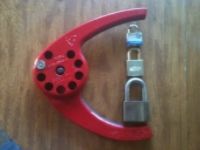|
Information about locks themselves. Questions, tips and lock diagram information should be posted here.
 by Eazy123 » 28 Dec 2016 10:57 by Eazy123 » 28 Dec 2016 10:57
I'm a beginner at this and just started a few months ago, but in the past week I've finally been able to pick THREE separate American 5200 locks so I feel like I'm on a roll lately. Well, my dad just gave me an old-ass Best lock - not sure of the number, it has a chain on it and all I can see is C9 on it. Pretty worn out. No key but I'm determined to get it and hopefully make a new key as well. Feels like there could be 7 pins in there and I know these have two shear lines so they're a bit more tricky.
Anyway, I've spent maybe three hours on it so far and have noticed that if I let go of all tension, a pin or two may pop back into place, but if I actually turn the plug even more counter clockwise a tiny bit, I'll hear quite a few drop. It's like it won't snap back all the way on its own. Is there something wrong with this plug?
-

Eazy123
-
- Posts: 206
- Joined: 17 Jul 2016 12:13
- Location: Chicagoland
 by ltdbjd » 28 Dec 2016 11:10 by ltdbjd » 28 Dec 2016 11:10
No, that's normal. After you try to pick most standard cylinder locks, including interchangeable cores, you will need to physically return the plug to its starting position to "reset" it.
Plugs will only snap back if thtere is a mechanism to bring it back. The most common example is the actuator in a padlock. You'll know if it will snap back when you pick it or use a key, because you will have to overcome spring tension to turn the plug.
In your example, the immediate pins dropping would be those sitting on the lip of the plug, while the others were well into the bible.
I'm presuming your Best lock is an interchangeable core. Those are very difficult to SPP because there are multiple shear lines. When you say you want to make a key for it, there are a minimum of two keys; an operating key (which unlocks it), and a control key (which removes the core). There is very frequently a master key as well.
-

ltdbjd
- Supporter

-
- Posts: 428
- Joined: 19 Jul 2016 19:16
- Location: Wyoming
 by Eazy123 » 28 Dec 2016 11:25 by Eazy123 » 28 Dec 2016 11:25
ltdbjd wrote:No, that's normal. After you try to pick most standard cylinder locks, including interchangeable cores, you will need to physically return the plug to its starting position to "reset" it.
Plugs will only snap back if thtere is a mechanism to bring it back. The most common example is the actuator in a padlock. You'll know if it will snap back when you pick it or use a key, because you will have to overcome spring tension to turn the plug.
In your example, the immediate pins dropping would be those sitting on the lip of the plug, while the others were well into the bible.
I'm presuming your Best lock is an interchangeable core. Those are very difficult to SPP because there are multiple shear lines. When you say you want to make a key for it, there are a minimum of two keys; an operating key (which unlocks it), and a control key (which removes the core). There is very frequently a master key as well.
Yes, it's an IC. Maybe I was just so used to picking the American Locks which always sprang back. In fact, I'm pretty sure I had my first one of those picked long before I even opened it - just didn't realize how much tension it took to turn the plug and figured it was still locked and gave up for a while! Stupid me. SPP'ing is working to a point since I'm getting quite a few pins set - but which shear line is anyone's guess. I'm going to try Bosnian Bill's suggestion of b*tch picking tonight. Is there any other method that's particularly effective over any others with locks like these?
-

Eazy123
-
- Posts: 206
- Joined: 17 Jul 2016 12:13
- Location: Chicagoland
 by Eazy123 » 28 Dec 2016 20:02 by Eazy123 » 28 Dec 2016 20:02
Woot! It's not to control like I wanted but it's a start! What tends to be more difficult - getting to control or operation? 
-

Eazy123
-
- Posts: 206
- Joined: 17 Jul 2016 12:13
- Location: Chicagoland
 by GWiens2001 » 28 Dec 2016 20:05 by GWiens2001 » 28 Dec 2016 20:05
Depends on the individual lock core, the bitting, how old the lock is, whether the control key has been used much if it is old, and many other factors.
To simplify the answer: It depends on what the lock prefers doing.
Gordon
P.S. - Congrats on picking it!
Just when you finally think you have learned it all, that is when you learn that you don't know anything yet.
-

GWiens2001
- Site Admin
-
- Posts: 7609
- Joined: 3 Sep 2012 16:24
- Location: Arizona, United States
 by Eazy123 » 28 Dec 2016 20:45 by Eazy123 » 28 Dec 2016 20:45
GWiens2001 wrote:Depends on the individual lock core, the bitting, how old the lock is, whether the control key has been used much if it is old, and many other factors.
To simplify the answer: It depends on what the lock prefers doing.
Gordon
P.S. - Congrats on picking it!
Thank you!!
-

Eazy123
-
- Posts: 206
- Joined: 17 Jul 2016 12:13
- Location: Chicagoland
Return to Locks
Who is online
Users browsing this forum: No registered users and 2 guests
|







